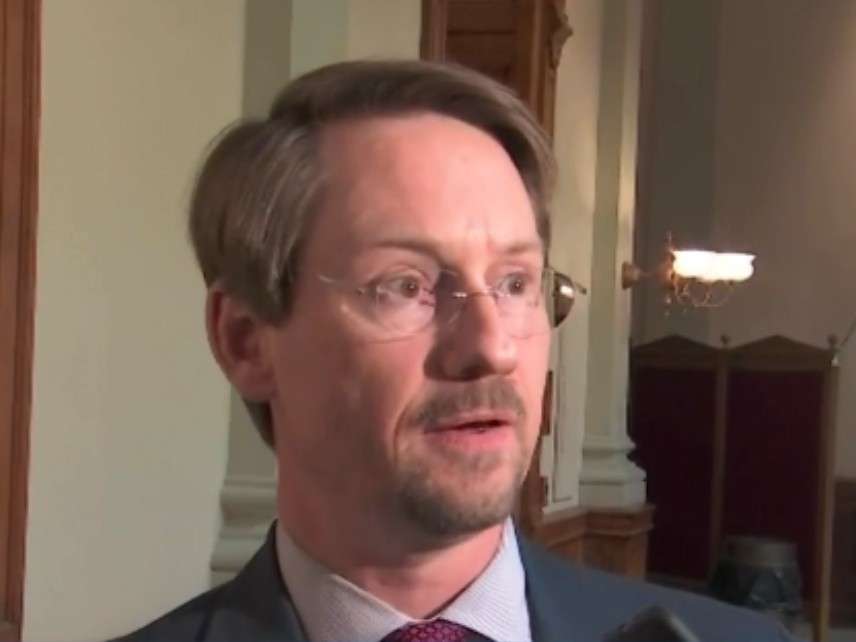Georgia Bill Would Mandate 'Journalism Ethics Board.' What Could Possibly Go Wrong?
Journalists would be expected to pay up for government records, while handing over their own records to government officials for free.

A Republican member of Georgia's General Assembly who was apparently upset over alleged media bias wants to regulate the news media.
Legislation introduced by Rep. Andy Welch (R–McDonough) on Tuesday would mandate the creation of a "Journalism Ethics Board." It would also force members of the media to comply with requests from interview subjects to provide, at no charge, the full, unedited versions of any relevant audio or video clips, as well as photographs. Journalists, essentially, would be expected to pay up for government records, while handing over their own records to government officials for free.
"That is not to say that the freedom to report is not there, it's just a question about what it means to be part of the press and whether or not there should be a set of canons of ethics that all members of media within the State of Georgia would be willing to live by," Welch told WGCL, explaining the reasoning behind the bill.
The legislation came after Welch claimed a TV reporter who asked him questions about separate legislation was biased, according to The Atlanta Journal-Constitution. The AJC also reported Welch was set to resign after the 2019 legislative session ended Tuesday. Reason reached out to Welch for comment on his bill, but did not hear back in time for publication.
The proposed law, titled the "Ethics in Journalism Act," is a doozy. The ethics board, it says, would consist of members of the media, as well as one retired journalism professor. Members would be chosen by a separate appointments board, which itself would be created by the University System of Georgia's chancellor.
Under Welch's bill, the ethics board's purpose would be open-ended. The legislation details some things it could, but would not be required, to do. These include things like creating "canons of ethics for journalism," establishing an accreditation process for journalists, and investigating complaints about alleged violations of the canons.
The legislation makes a point of emphasizing that the government would not be involved in the ethics board itself. It does not detail why the board is necessary, and its open-ended nature makes you question why the government needs to mandate its creation in the first place. Of course, there's always reason for concern when the government proposes any sort of new regulatory body, particularly one that would regulate the media, who are supposed to act as watchdogs who make government misconduct public.
The second part of the legislation is also problematic:
An individual who is interviewed may make the request for a copy of such audio or video recording or photographs directly to the member of the media conducting the interview, to the employer of the member of the media conducting the interview, to the person making the audio or video recording of the interview or taking photographs in connection with the interview, or to the media outlet that runs a story relying on such interview or the audio or video recording of such interview or photographs taken in connection with such interview. Such request shall be made within 60 days of the date that the interview was conducted.
Media outlets would have three days to provide such materials at "no cost to the individual making the request for such copies." Violating this second part of the legislation would make outlets liable to civil suits.
It's difficult to see this bill as anything more than a way for politicians to try and wiggle their way out of bad press coverage. There's a much easier solution for lawmakers who want access to recordings of interviews: Record those interviews themselves. Alternatively, they could just not say things that will make them look bad.
Forcing reporters to hand over their own materials related to such interviews—essentially their own private property—sets a terrible First Amendment precedent. "First I thought this was an April Fools' joke, but this is clearly an effort to rein in those who have been scrutinizing what's been happening at the Legislature," Richard T. Griffiths, president of the Georgia First Amendment Foundation, told the AJC. "In this country there is a First Amendment which reads, in part: Congress shall make no law…abridging the freedom of speech or of the press. This applies even to the Georgia Legislature."
Jonathan Peters, a press freedom correspondent for Columbia Journalism Review and a media law professor at the University of Georgia, had a more concise response:
Georgia lawmakers have filed legislation to create a state Journalism Ethics Board to develop "canons of ethics" for journos. Also authorizes civil penalties if news orgs don't grant certain access to work product. https://t.co/bqby5h0IQA My full statement is below: pic.twitter.com/AlR2LtUOs5
— Jonathan Peters (@jonathanwpeters) April 3, 2019
Then there's the issue of photographers, many of whom license their photos, being forced to hand over their own work.
The legislation is also hypocritical. Georgia's Open Records Act allows members of the public, including journalists, to access public records. But documents relating to the General Assembly itself, including legislative records, are largely exempt. The Institute for Justice, a libertarian law firm, has challenged this exemption, at least in regard to agencies under the General Assembly, in court. The Georgia Court of Appeals heard arguments regarding the matter in December, the AJC reported.
It's also worth noting that records which are not exempt under the Open Records Act cost money to access. "An agency may impose a reasonable charge for the search, retrieval, redaction, and production or copying costs for the production of records," the act reads. If journalists have to pay for government records, why should government officials be able to access journalists' records for free?
The bill cannot be voted on until the 2020 legislative session starts. Hopefully, the outcry from First Amendment advocates will be anough to doom its chances.


Show Comments (52)